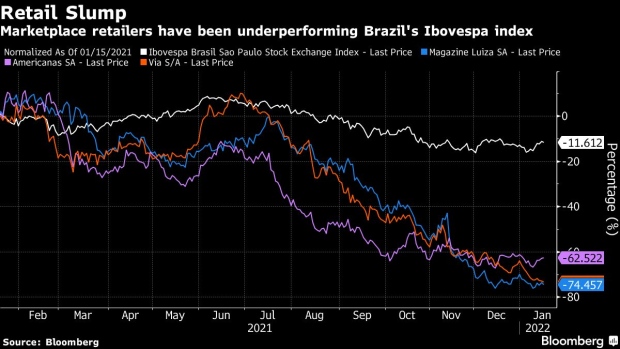Jan 18, 2022
Shopee’s Rise Raises Risks for Brazil’s Battered Retail Stocks
, Bloomberg News

(Bloomberg) -- The rapid expansion of Sea Ltd.’s Shopee e-commerce platform in Brazil has emerged as the latest threat for the country’s retailers, posing a risk to any recovery in their battered shares.
Retailers Americanas SA, Magazine Luiza SA and Via SA have all extended losses this year after slumping at least 58% in 2021, while an MSCI index for consumer-discretionary company shares trades near the lowest since 2004. The weakness has been driven by tepid economic growth prospects in Brazil, anticipation of a slowdown in earnings and mounting fears over the competitive landscape.
Investors have been particularly interested in Shopee, which started its operations in Brazil in 2019, focused on low-ticket items. Its e-commerce market share in the country is estimated by Goldman Sachs Group Inc. to be in the high single-digits.
Competition from the Southeast Asia giant became “a key topic” last year, Goldman analysts led by Irma Sgarz wrote in a report dated Jan. 12, adding that the firm’s market share could rise to 20% by 2025. “We expect it to remain relevant in 2022 as it continues to build out its presence and service offering.”
Shopee’s local operations in Latin America have been gaining traction and the company was mentioned as a top-three e-commerce purchase destination by 37% of consumers last year, up from 6% in 2020, Morgan Stanley analysts including Mark Goodridge and Andrew Ruben said, citing data from the bank’s Alphawise survey.
According to Morgan Stanley, the rise of Shopee adds to the risks for the margins of local retailers at a moment when these companies are already struggling with rising input costs.
MercadoLibre Inc. the Buenos Aires-based e-commerce giant that counts Brazil as its largest market, has lost about $41 billion of its market value since peaking in January 2020, also hurt by a rotation away from high-growth, tech stocks amid rising rates.
Magazine Luiza, Via and Shopee declined to comment, while Americanas and MercadoLibre didn’t immediately reply to a message seeking comments.
To be sure, Shopee isn’t the only international player that has been trying to lure Brazilian consumers. Amazon.com Inc. entered Brazil in 2012 and has been scaling up its operations since then, opening over 10 distribution centers. At a first, the Seattle-based giant’s expansion was enough to spark a selloff in the sector, but investor concern has somewhat eased over time.
For Shopee to sustain its growth, the company will need to build out additional logistics capabilities in the region, as well as lean into higher-cost items, Goldman’s Sgarz said.
But in the short term, shares of retailers may get no relief as signs of deceleration will likely be seen in forthcoming earnings, according to Welliam Wang, head of equities at AZ Quest.
Wang, who has short positions in Brazilian e-commerce stocks, says results should remain under pressure in the first quarter, with ample room for downward revision in earnings estimates. Only two analysts tracked by Bloomberg lowered their 2022 earnings estimates for Magazine Luiza in the past four weeks -- both of them downwards.
“The weakness might start translating into a more structural questioning from investors on whether these platforms will be able to compete with global players, which have vast fire power,” Wang said.
©2022 Bloomberg L.P.





